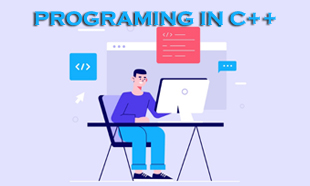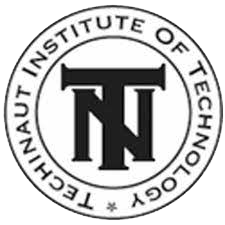In the programming world, C++ is a powerful and versatile language known for its efficiency and flexibility. SHREE RADHA KRISHNA INSTITUTE OF COMPUTER SCIENCE, a Techinaut Institute of Technology franchise based in Chandrapur, Maharashtra, offers a six-month course titled "Programming Course in C++." This course will equip participants with the skills and knowledge needed to become proficient C++ programmers.
COURSE OBJECTIVE:
The "Programming Course in C++" aims to provide students with a comprehensive understanding of the C++ programming language and its applications. By the end of the course, participants will be able to write efficient, robust, and maintainable C++ code for various software development projects.
SECTION 1: INTRODUCTION TO C++
This section provides an overview of the C++ programming language, including its history, features, and applications. Students will learn about the benefits of using C++ for software development and how it compares to other programming languages.
SECTION 2: OBJECT-ORIENTED PROGRAMMING CONCEPTS
Here, students will learn about object-oriented programming (OOP) principles and how they are implemented in C++. Topics covered include classes, objects, inheritance, polymorphism, and encapsulation.
SECTION 3: THE BASICS OF C++
This section covers the basic syntax and structure of the C++ language, including data types, variables, constants, and basic input/output operations. Students will also learn basic programming concepts such as loops and decision-making statements.
SECTION 4: WORKING WITH OPERATORS AND EXPRESSIONS
Students will learn about the various operators available in C++ and how to use them to perform arithmetic, logical, and bitwise operations. They will also learn about expressions and how to use them in C++ programs.
SECTION 5: CONTROLLING THE PROGRAM FLOW
This section covers control flow statements in C++, including if-else statements, switch statements, and loops. Students will learn how to use these statements to control the flow of execution in their programs.
SECTION 6: USING FUNCTIONS/PROCEDURES
Students will learn about functions in C++ and how to define and use them in their programs. Topics covered include function prototypes, function definitions, and parameter passing.
SECTION 7: POINTERS AND ARRAYS
Here, students will learn about pointers and arrays in C++. They will learn how to declare and use pointers, as well as how to work with arrays and multidimensional arrays.
SECTION 8: BINDING DATA AND FUNCTIONS
This section covers the concept of binding in C++, including static and dynamic binding. Students will learn how data and functions are bound together in C++ programs.
SECTION 9: FUNCTION AND OPERATOR OVERLOADING
Students will learn about function overloading and operator overloading in C++. They will learn how to define multiple functions with the same name but different parameters and overload operators for custom types.
SECTION 10: REUSING CLASSES
This section covers the concept of class reusability in C++. Students will learn to create and use class templates to create generic classes with different data types.
SECTION 11: VIRTUAL FUNCTIONS AND POLYMORPHISM
Here, students will learn about virtual functions and polymorphism in C++. They will learn how to use virtual functions to create classes that can be overridden by subclasses, allowing for dynamic polymorphism.
SECTION 12: TEMPLATES, EXCEPTION HANDLING, ETC.
This section covers advanced topics in C++ programming, including templates, exception handling, and the Standard Template Library (STL). Students will learn how to use templates to create generic classes and functions and how to use exception handling to manage errors in their programs.
CONCLUSION:
The "Programming Course in C++" at SHREE RADHA KRISHNA INSTITUTE OF COMPUTER SCIENCE offers a comprehensive and in-depth curriculum to provide students with a solid foundation in C++ programming. Whether for beginners or experienced programmers looking to enhance their skills, this course is designed to help participants become proficient C++ programmers capable of tackling various software development projects.
Lectures = 130 HRS
Practical/Tutorials = 130 HRS
Total = 260 HRS
 ADVANCE DIPLOMA IN FINANCIAL APPLICATION (SRKI)
1 × ₹10,000.00
ADVANCE DIPLOMA IN FINANCIAL APPLICATION (SRKI)
1 × ₹10,000.00  DIPLOMA IN FINANCIAL APPLICATION (SRKI)
1 × ₹10,000.00
DIPLOMA IN FINANCIAL APPLICATION (SRKI)
1 × ₹10,000.00  ADVANCE EXCEL (CDCO)
1 × ₹13,000.00
ADVANCE EXCEL (CDCO)
1 × ₹13,000.00  BASIC OF COMPUTER COURSE ACIT
1 × ₹22,000.00
BASIC OF COMPUTER COURSE ACIT
1 × ₹22,000.00  DIPLOMA IN COMPUTER APPLICATION (NAEC)
1 × ₹3,000.00
DIPLOMA IN COMPUTER APPLICATION (NAEC)
1 × ₹3,000.00  DIPLOMA IN COMPUTER APPLICATION (SRKI)
1 × ₹10,000.00
DIPLOMA IN COMPUTER APPLICATION (SRKI)
1 × ₹10,000.00  ADVANCE DIPLOMA IN COMPUTER APPLICATION (COSO)
1 × ₹10,000.00
ADVANCE DIPLOMA IN COMPUTER APPLICATION (COSO)
1 × ₹10,000.00  BASIC OF COMPUTER COURSE GCEC
1 × ₹13,000.00
BASIC OF COMPUTER COURSE GCEC
1 × ₹13,000.00 

